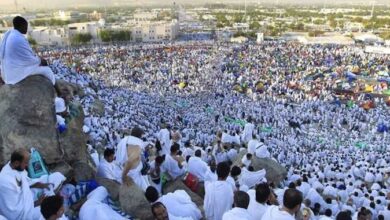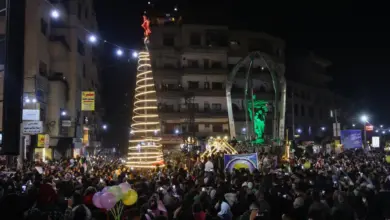Sunday’s bloody attack on a Coptic-led protest stands as fresh evidence of the incompetence of Egypt’s military rulers, who might lead the country towards “catastrophic” scenarios, experts contend.
“This [incident] reflects an unprecedented failure in running the country during the transitional period,” said Khalil al-Anani, a UK-based Egyptian political analyst. “Since 11 February, the country has been going from worse to worst.”
“If the military stays in power for much longer, the country might head towards more violence, and social peace will be in jeopardy,” added Anani.
On Sunday, violence erupted as thousands of Christian demonstrators were marching towards Maspero to protest against discrimination. The march came on the heels of an attack on a local church by Muslims in the Upper Egyptian province of Aswan last month. Stones were thrown back and forth, and eventually the military and the Central Security Forces intervened. At least 25 people, including three military officers, were killed.
Tear gas and live ammunition were deployed to disperse the crowd and armored vehicles were seen running over protesters. In the meantime, the state-owned TV channels reported that Copts were attacking the military. An anchor had reportedly called on people to take to the streets and protect the military from Coptic demonstrators.
Although the military has previously committed human rights violations in dispersing other anti-establishment protests, this is the first time army officers have been directly implicated in killing civilians. Yet, Anani refuses to pinpoint any sectarian connotation in this paradox.
“What happened is not sectarian, nor religious, but it is a reflection of a failure to manage the crisis, which eventually led to the excessive use of violence against peaceful people,” said Anani.
Yet, not everyone agrees with Anani’s reading.
For Karima Kamal, a columnist, last night’s violence proves that the Supreme Council of the Armed Forces (SCAF) is reproducing the same sectarian policies of Hosni Mubarak's regime, which discriminated against Christians.
“The SCAF's performance on the sectarian portfolio has been really bad since the revolution. They are dealing with the matter the same way Mubarak was. What new regime are we speaking of?” Wondered Kamal.
Under Mubarak, Copts voiced a plethora of grievances, including hurdles to the construction of churches and discrimination in the distribution of public offices. Under Mubarak's rule, Copts were often subjected to similar attacks, including attacks by radical Muslims on churches, which were sometimes set on fire.
Shortly before Mubarak’s fall, on New Year ’s Eve, a terrorist attack on a Coptic church in the Mediterranean city of Alexandria caused widespread outrage among Christians. Thousands of Copts took to the streets and clashed with the police, accusing the government of failing to protect churches. Yet, the fall of the 83-year-old former pilot did not necessarily mark the end of sectarian violence.
Several incidents, mostly blamed on Salafis, erupted in Cairo and Upper Egypt. In May, at least 12 people were killed and a church was set in fire in Imbaba. Earlier, radicals were blamed for demolishing a church in a rural area south of Cairo and for cutting off the ear of a Christian man in Qena.
Except for the Imbaba clashes, in most incidents, the military did not bring the culprits to justice and preferred to use customary reconciliation procedures to solve disputes between Muslims and Christians. In the meantime, the SCAF failed to pass long-awaited legislations that would ease the restrictions on the construction of churches and criminalize discrimination.
With what is believed to be half-solutions, “the military has given a clear sign that Copts are easy targets,” said Kamal.
“We have reached the climax… We will either have a civil war or rational people will be able to take the country in the right direction,” she added.
The SCAF issued a statement on Monday expressing sorrow over the incident and paying condolences to victims’ families. It also announced that it had asked the cabinet to form a fact-finding commission to investigate the incident. Earlier, Prime Minister Essam Sharaf addressed the nation in a televised speech blaming the violence on hidden local and foreign hands that seek to threaten Egypt’s stability and thwart the transition to democracy. State-owned media reported that 25 suspects had been identified and were being interrogated.
However, this conspiracy-theory-based explanation failed to convince most observers.
“This weak speech given by the prime minister is not even up to the standards of Mubarak’s speeches,” said Sameh Fawzi. “Please identify these foreign hands. We cannot live with this conspiracy for long.”
The Coptic question stands as one of the most sensitive dossiers locally and internationally. On the international level, discrimination against Copts has been one of the main sources of embarrassment for Egypt. The US State Department's annual International Religious Freedom Report always criticized Mubarak’s regime for not treating Muslims and non-Muslims equally. In early 2011, Catholic Pope Benedict XVI's called on Western governments to protect Egypt’s Christian minority, which constitutes nearly 10 percent of the total population. The statement was seen by Mubarak’s regime as a flagrant attempt at meddling in domestic affairs.
The US Embassy in Cairo issued a statement earlier today reading: “We are deeply concerned by the violence between demonstrators and security forces in Cairo… We express our condolences to their families and loved ones.“
“We note Prime Minister Sharaf's call for an investigation, and appeal to all parties to remain calm,” added the statement emailed to local journalists.
In the meantime, the embassy press office denied earlier reports quoting US foreign minister Hillary Clinton as saying that the US could send troops to protect churches in Egypt.
Although the scenario of foreign intervention seems far-fetched now, Kamal Zaker, a Christian intellectual warned that it might eventually happen if Egypt’s new rulers failed to heal the root causes of the Coptic community's problems.
“What I really fear is that if local solutions fail, the door will be open to international solutions, and Egypt will be headed down the same path as Iraq,” said Zakher, who himself opposes any internationalization of the problem.




